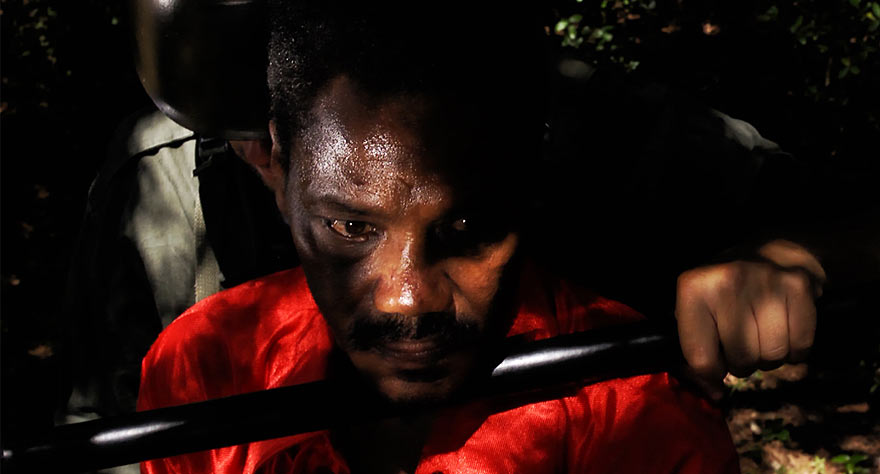
Vivid and peculiar memories of the Carnation Revolution continue in Pedro Costa's latest mind-sapping hybrid.

Vivid and peculiar memories of the Carnation Revolution continue in Pedro Costa's latest mind-sapping hybrid.
Aim to throw away all cinematic preconceptions before seeing Pedro Costa’s latest and most profound addition to his exploration of desperate minds set amidst the shattered and malfunctioning Lisbon district of Fontainhas. Costa’s previous film, Colossal Youth, also featured the impoverished Cape Verde immigrant, Ventura, wandering in turmoil between places new and old, but in Horse Money Ventura’s adventures reach new-fangled metaphysical heights. A detailed plot is not provided, as Costa clearly thinks it would be inapplicable to the world that Ventura occupies. Horse Money is divided into scenes set among barely recognizable spaces, with their desolation and subterranean features being the only immediate correlation between them. The effect can be paralyzing and often unforgiving, but it never feels like Costa loses his strong command over the material.
The film may already sound very disturbing and the least bit entertaining (indeed, the film is both of these things), but it’s for the right reasons. Horse Money is enriched with poetic images, expressive sequences with a dated quality of precise staging and chiaroscuro lighting, which feels disquieting through its mythical and yet somehow matter-of-fact nature. The entire docu-fiction genre gets reinvigorated, and it becomes almost impossible to tell if Costa is documenting fiction, reality, or some intoxicated cyberspace. This esoteric quality is deep-seated and powerful, but has the danger of becoming too transparent. The dialogue (spoken, whispered, or chanted) comes mostly from the mind of Ventura, as projected by his fears, his vivid memories, or his fractured cognizance, and has the tendency to become pandering or overly excessive. Film is a medium of actions (show, don’t tell—the common aphorism in the filmmaker’s guide) and it can also be a language of poetics, but the limited movement and spelt out misfortunes of Ventura and his few cohorts quickly becomes a drag. The performances by non-actors are complimentary and deeply troubling, but there is only so much that a face and a trembling hand can show.
Vitalina (Vitalina Varela), a harrowing figure of a widowed woman, whispers in complete submission to Ventura about her misfortunes, telling him they are on a “road to perdition.” Costa is making Ventura (and his audience) reach a state of purgatory that leads only one way: hell on earth. “I wanted to kill him with an axe, but my brothers stopped me.” This line whispered by Vitalina is even more shocking than it sounds with the addition of stark visuals. Vitalina sits at a bare desk playing with a peculiar piece of jewellery, the camera stares at her intolerable expression of sadness, and it feels like any minute the spell cast by her delicate recital might just explode. Ventura listens in his underwear and slowly stands up from his derelict bed, seemingly unfazed, but clearly inundated by deep thoughts. Costa is able to deliver these glowing memories of his characters while sustaining a deep interest in their mind games. Such expression would be seemingly more suited to the novel, but it is as if the screen is the writing on the page.
Everything about Horse Money is intellectually stimulating: It is hypnotic in style, its narrative is cryptic, and the layers are as convoluted as the layers of our very own minds. A similar resistance to convention is felt in the works of Jean-Marie Straub and Danièle Huillet, the French filmmaking duo relentless in their uncompromising style. There are endless talking points or interpretations of such films and, occasionally, a line should be drawn in finding a mutual or direct understanding of what it is the filmmakers are getting at. The level of meaning they are able to put into their work, be it autobiographical or universal, is dependent on the director’s abilities. It is understandable that Costa was awarded Best Director at Locarno Film Festival in 2014 and has gathered a dedicated following. However, without a prior knowledge of the ins and outs of Costa’s oeuvre and his parallel personal activities, some may find it hard to navigate the underlying intentions of a film like Horse Money.
Regardless of Costa’s style, there is emotion to be felt and, though haunting, there is a tension in Ventura’s solemn encounters. Long takes of Ventura walking down the street in his underwear talking to himself may be funny or endearing, or both, depending on which way your senses swing. The secret to understanding such a perplexing director may be to hold on firmly to an open mind and be open to Costa’s desire to shock us with his open-ended convolutions of a society paralyzed by corruption, poverty and sickness. Brace yourself.